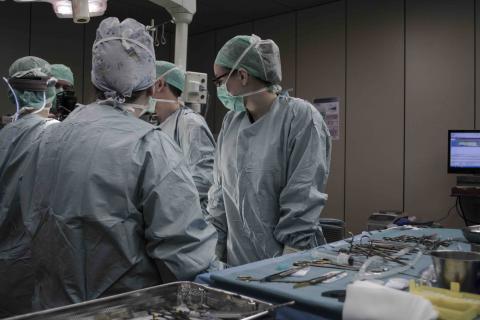121 S. Wilke Road, Suite 301, Arlington Heights, IL 60005
Home and Hospital Visits for Your Convenience
Serving Clients Across 7 Illinois Locations
Recent Blog Posts
What are the Claims Against Prilosec and Nexium?

Nexium and Prilosec are two drugs produced by pharmaceutical manufacturer AstraZeneca that are used to treat gastroesophageal reflux disease (GERD). They belong to a category of drugs known as proton pump inhibitors (PPIs) and both are available to users without a prescription.
Another similarity between the drugs is that both have been named in defective drug lawsuits alleging that they are unreasonably dangerous and that their manufacturer was negligent by failing to properly test the drugs, failing to warn consumers about the risks associated with taking these drugs, and that it actively concealed the drugs' dangers to the Food and Drug Administration (FDA) and misrepresented the drugs in its marketing materials.
Side Effects Associated with these Drugs
Individuals who claim they were hurt by using these drugs allege that they experienced side effects they were not warned about. These side effects include:
How a Bair Hugger can Hurt a Patient

During surgery, the patient's body needs to be kept at a safe, consistent temperature. When the patient's body temperature drops below 96.8 degrees Fahrenheit, he or she can suffer from perioperative hypothermia, a condition associated with blood loss, an increased risk of infection, and an increased mortality rate.
Various machines exist to regulate patients' body temperatures during surgery, one of which is the 3M Bair Hugger. Recently, a group of patients who suffered infections after knee and joint replacement surgeries filed a class action defective medical device lawsuit against 3M, alleging that the warming system circulated contaminants through their bodies that caused them to suffer infections. The plaintiffs allege that the Bair Hugger system is unreasonably dangerous because 3M was negligent in its manufacture. According to the claim, 3M failed to properly test the device and did not warn healthcare providers or patients of the risks associated with its use.
When a Drug's Risks are Not Advertised, it is a Defective Drug

Drug manufacturers have the responsibility to disclose all potential side effects of their products. They must be disclosed to doctors who may prescribe the products to patients and to patients who may take the drugs. By providing this information, drug companies make it possible for doctors to weigh the benefits and potential risks of a particular medication before prescribing it to a patient and patients can consider whether the benefits outweigh the risks before deciding whether or not to take the medication. Without disclosures of potential side effects, doctors and patients cannot make fully informed decisions about their drug use.
When doctors and patients choose not to take a drug because of its risks, drug sales plummet. Thus, it can be quite lucrative for drug manufacturers to downplay or even fail to advertise their products' potential risks despite this being a dishonest act and a violation of their product liability. Drug manufacturers are liable for the damages victims suffer from using their products, which can be sought through defective drug claims.
Understanding the 2017 Invokana Dangerous Drug Claims

Numerous claims have been filed against Johnson & Johnson and Janssen Pharmaceuticals, the manufacturers of diabetes medication Invokana. These claims allege that the manufacturers did not adequately warn doctors and their patients of the drug's potential side effects, which include an increased risk of kidney failure, foot and leg amputations, and ketoacidosis.
Like manufacturers of other consumer products, drug manufacturers have the responsibility to ensure that their products are safe for consumers to use before releasing them to the market. When a product cannot be released without some potential for side effects, manufacturers must clearly warn patients and the physicians who prescribe their products about these side effects so they can make informed decisions about using the drugs. A patient who is harmed because of a manufacturer's failure to disclose a drug's side effects can seek compensation for his or her related damages through a defective drug claim.
How Can Abilify Hurt Me?

Abilify is an antipsychotic drug used to treat bipolar disorder, depression, schizophrenia, and Tourette Syndrome. In certain cases, it can also help autistic individuals manage their irritability. Its generic name is Aripiprazole. It is also sold under the brand names Aristrada and Abilify Maintena.
Any drug can have potentially harmful side effects. Drug manufacturers have the responsibility to disclose these side effects to doctors who might prescribe the drug and patients who might take it. When a patient suffers from these side effects without realizing the risk he or she took by taking the medication, the patient may seek compensation for his or her resulting damage through a defective drug claim.
Abilify can Create Uncontrollable Urges
The main side effect of Abilify is its potential to create uncontrollable urges in patients. These urges can lead to compulsive behaviors like promiscuous sex, gambling, and shopping. A patient who suffers from these urges can lose money, contract STIs, or cause an unintended pregnancy, or if he or she eats compulsively as an effect of taking Abilify, gain weight rapidly and suffer from the effects of obesity.
Kaiser Gypsum Files for Bankruptcy Amid Asbestos Exposure Claims

Throughout the 19th and first half of the 20th century, asbestos could be found in nearly everything. Paint, shingles, pipes, certain textiles, household goods, and drywall were just some of the many products that contained the heat-resistant mineral. As more and more scientific evidence linking asbestos exposure to illnesses like mesothelioma was released, governments around the world limited and even banned the use of asbestos. Today, asbestos is banned from being used from most, but not all, consumer products in the United States.
When an individual suffers an illness as the result of asbestos exposure, he or she may seek compensation for damages through an asbestos exposure claim. The compensation amounts secured by claimants can be fairly high, putting a financial strain on the companies responsible for those illnesses and pushing them toward bankruptcy. This is the case with Kaiser Gypsum, a former drywall manufacturer based in North Carolina. The company has faced 13,967 asbestos exposure claims, 1,498 of which were filed by claimants in Illinois. Although the company stopped producing drywall many years ago, it remains in existence to pay out compensation amounts to individuals affected by asbestos exposure.
The Federal Tort Claims Act: Making a Claim against the United States of America in Tort
The Federal Tort Claims Act (FTCA) is one of the earliest forms of Tort Reform. While today, most FTCA claims are against the Post Office, the FTCA finally came to fruition after a tragic, 1945 event where a United States Military bomber pilot crashed into the Empire State Building. The pilot who was flying service men from Massachutes to Laguardia Airport flew his plane through thick fog, attempted to land in Laguardia Airport without clearance. Flying with near zero visibility, he crashed his plane into the Empire State Building. The crash killed fourteen, including the pilot himself. Following the crash, when family members of those killed and injured attempted to seek recovery, they were barred from suing the government by sovereign immunity as the pilot was acting in his capacity as a government agent. Even though, the United States Government offered the families monetary compensation for their loss, several of the families declined and proceeded with a law suit against the US Government. Those lawsuits seemed to be the final push legislators needed to finalize the contents of the FTCA. While the FTCA wasn't enacted until 1946, it was made retroactive to allow families of the 1945 plane crash to recover under it.
FDA Consent Decree Halts Most Sales of Infusion Pump
The United States Food and Drug Administration (FDA) announced this week that the agency has filed a consent decree against a medical device manufacturer for repeatedly failing to correct identified violations related to an implantable drug infusion pump. A consent decree is a type of legal settlement in which the manufacturer agrees to follow the court-ordered directives without acknowledgement of fault or guilt. The decree will remain in force until regulators are convinced that the company has addressed and fixed the identified issues.
The SychroMed II Implantable Infusion Pump System is a device designed to deliver medication necessary for the treatment of cancer, chronic pain, and sever spasticity. Medtronic, the manufacturer of the device, says that more 230,000 patients have used a SynchroMed system since it was developed more than 25 years ago. However, inspections by the FDA in 2006 and 2013 identified "significant violations" of federal regulations, including issues related to handling complaints and corrective actions. A warning letter from the FDA in 2012 noted the devices' propensity to stall and subsequently fail to deliver the needed medication.
FDA Launches Home-Use Medical Device Pilot Program
Every year, more than 7 million patients receive home health medical care under the direction of their medical providers. Many such cases require the use of medical devices in the home to treat or maintain a wide variety of conditions. The devices are put to use by the patient directly, or with the help of a caregiver or family member. While, to a certain extent, home health providers may be able to offer a degree of training in the proper utilization of a home-use medical device, federal regulators have expressed concern over the lack of a standardized labeling format for the devices.
Home-use medical devices include a wide range of equipment, including more simple things like canes and crutches, to more complicated items such as infusion pumps, glucose monitors, and continuous positive airway pressure (CPAP) machines. According to the U.S. Food and Drug Administration (FDA), there have increasing reports of adverse events related to medical devices used in the home, many of them related to the unavailability of the manufacturers instructions.
Insurance Carriers Push for Stronger Regulations on Medical Devices
An influential health insurer trade group has called for more stringent rules related to the approval and tracking of medical devices. The request follows revelations of gaps or loopholes in the federal regulatory procedures which allow potentially dangerous medical devices to be put on the market with minimal safety and performance testing. In particular, the group referenced a medical tool used in performing hysterectomies which, despite being widely available, has been found to contribute to the spread of cancer in patients.
This week, America's Health Insurance Plans, an organization representing nearly 1300 health insurers who provide coverage for over 200 million Americans, sent a letter to United States Senator Bob Casey, D-Pennsylvania, citing the dangers discovered regarding laparoscopic power morcellators. Since the 1990s, morcellators have been used to remove fibroids, or benign uterine growths, frequently during hysterectomies. Last year, the U.S. Food and Drug Administration (FDA) announced that women undergoing such procedures may be at higher risk for a certain type of malignant cancer, and use of the devices can potentially spread the cancerous tissue and worsen the condition.

 Spanish
Spanish


















